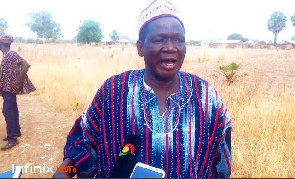Bawku ethnic conflict factions to smoke peace pipe April 13

Feuding factions in the long-standing inter-ethnic conflict in Bawku in the Upper East Region have unanimously resolved to cease hostilities towards each other and live in harmony with a traditional ceremony slated for Saturday, April 13, 2019.
The ceremony which is called the “Burial of the Okro Stick” would involve the sacrifice of cows and sheep to cleanse the land to usher in peace and a new dawn of hope.
It is believed that any family or individual that does not uphold the tradition and continues to fight in the community will incur the wrath of the gods of the land.
The ceremony is part of strategic measures rolled out by members and stakeholders of the Bawku Inter-Ethnic Peace (BIEPC) Committee to promote lasting peace in Bawku and its environs.
Lasting solution
The secretary of the Bawku Traditional Council (BTC), Mr PatricK Adakudugu, told the Daily Graphic that the tradition involved the performance of rituals, using animals to pacify the gods to foster peaceful coexistence among the people by landlords who undertake this in the communities involved in the conflicts.
According to him, after the “Burial of the Okro Stick” the feuding factions would be free customarily to mingle and forget about the wounds of the conflict.
“ April 13, 2019 will be the “Burial of the Okro Stick” and when this is done, nobody has the moral right to unearth the conflict that erupted several years ago. When you do that it is our believe that you will incur the wrath of the gods and the gods will punish you” he stated.
Mr Adakudugu who is also a member of the inter-ethnic peace committee urged residents and indigenes of Bawku and its environs that fled as a result of the protracted conflict to return home as calm had been restored to the area.
Ban on ‘spinners’
In a related development, the Bawku Traditional Council has placed a ban on the use of ‘spinners’ for celebrations in the area as part of efforts to curb immoral practices among the youth.
The move was also to minimise the use of western music and dance for ceremonies which the youth were used to, to the total neglect of traditional music and dance.
Source: Graphic.com.gh





